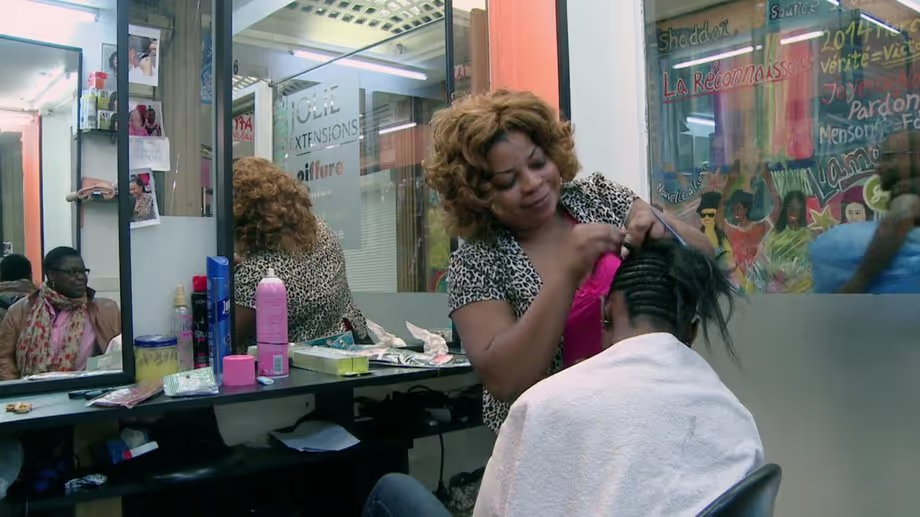Chez Jolie Coiffure: Understanding the Push and Pull of International Migration Film Clips
Film Clips

CLIP 1, “A girl here, who went on the road…” (6:00 - 10:00, length: 4:00 minutes)
This clip starts at 06:00. in the Jolie Coiffure Salon with Sabine telling her story: “A girl here, who went on the road, who walked across deserts, waters…”It ends at 10:00 mins. with Sabine saying, “So she decided to come here and try her luck. That's how it is.”
Speaking to filmmaker Rosine Mbakam, Sabine begins to recount the harrowing story of “a girl” from Cameroon who went to Lebanon for a promising position as a domestic worker. Soon after arriving, the girl was instead kept prisoner by her abusive employers for two years before she escaped and travelled by land to Belgium. As Sabine narrates, it soon becomes apparent that this is her own traumatic story, and she is choosing to talk about herself in the third person, perhaps to safeguard her identity or as a defense against the painful memories of her journey.
CLIP 2, “I saw a report about the Lebanon.” (14:55 - 16:18, length: 1:23 minutes)
This clip starts at 14:55 mins. as Mr. Gizzard arrives in the salon and says, “Sabine, I heard that some people will be regularized” and ends at 16:18 mins. with him saying, “They showed girls over there. Oh Lord!”
Sabine’s friend, “Mr. Gizzard”, stops into the salon for one of his regular visits, and they begin to share and debate the latest rumors about immigration policy including the possibility that the Belgian government may “regularize” up to 4,000 immigrants. Soon, Mr. Gizzard turns the conversation to a television report he saw on the abuse of immigrant women in Lebanon. He explains his shock at the extent of the pain and trauma inflicted on the women as Sabine reckons with her own trauma by expressing her anger and frustration with the perpetrators, enablers, and even the victims themselves.
CLIP 3, “By word of mouth, they bring girls in.” (40:31 - 44:54, length: 4:23 minutes)
This clip starts at 40:31 mins. with the filmmaker Rosine asking Sabine, “Is it the Lebanese agencies that look for African women?” and ends at 44:54 mins. with Sabine saying, “I can't recall what month I left Cameroon.
Sabine begins talking to director Rosine Mbakam who turns the discussion to Sabine’s own experience with Lebanon’s “Kafala system”. Kafala is the exploitative system that recruits migrant workers from developing countries and takes adavantage of their vulnerable circumstances by stripping them of their rights and freedom of movement, often resulting in unchecked physical and sexual abuse. Sabine explains how women like her are recruited through word of mouth and that the true nature of the “job offer” only became clear once she was in Lebanon and her passport was taken from her. Sabine once again recounts the shocking story of her escape from Lebanon and migration to Belgium, this time in the first person. She also shares her distress about having her application for asylum rejected and the uncertainty about her future.
CLIP 4, “Life hangs by a thread.” (45:36 - 51:10, length: 5:34 minutes)
This clip starts at 45:36 mins. with Sabine reacting to a commotion in the mall outside her salon asking, “What’s going on?” and ends at 51:10 mins. when Sabine says to her friend Jimmy, “This little Matonge is where we earn a living and they want to take it away.”
Sabine sees a commotion outside her salon and learns that the police are raiding the market looking for undocumented immigrants. She quickly turns out the lights just as the police pass the salon window. Suspecting that they may still be at risk, Sabine heads out in search of information, returning moments later to tell the filmmaker and her client that they need to lock-up and “run”. The next day, Jimmy, a friend from a nearby shop comes by to ask Sabine for details about the raid. Although they are both shaken by the event, Sabine tries to reassure her friend that the threat is over for the moment as she returns to her work in the face of an uncertain future.
